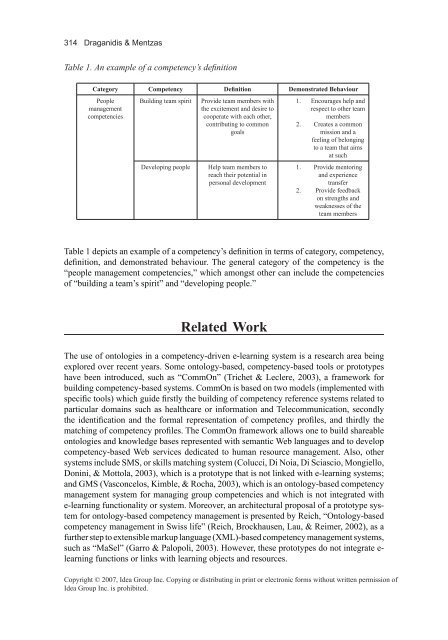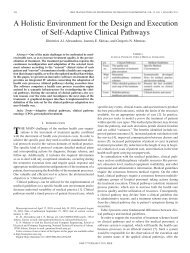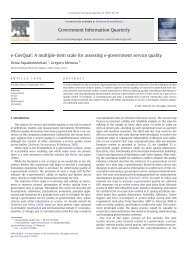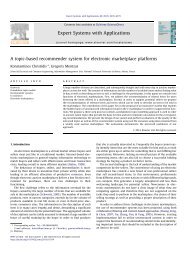Ontology-Based Competency Management for Corporate E-Learning
Ontology-Based Competency Management for Corporate E-Learning
Ontology-Based Competency Management for Corporate E-Learning
You also want an ePaper? Increase the reach of your titles
YUMPU automatically turns print PDFs into web optimized ePapers that Google loves.
314 Draganidis & Mentzas<br />
Table 1. An example of a competency’s definition<br />
Category <strong>Competency</strong> Definition Demonstrated Behaviour<br />
People<br />
management<br />
competencies<br />
Building team spirit Provide team members with<br />
the excitement and desire to<br />
cooperate with each other,<br />
contributing to common<br />
goals<br />
Developing people Help team members to<br />
reach their potential in<br />
personal development<br />
Table 1 depicts an example of a competency’s definition in terms of category, competency,<br />
definition, and demonstrated behaviour. The general category of the competency is the<br />
“people management competencies,” which amongst other can include the competencies<br />
of “building a team’s spirit” and “developing people.”<br />
Related Work<br />
1. Encourages help and<br />
respect to other team<br />
members<br />
2. Creates a common<br />
mission and a<br />
feeling of belonging<br />
to a team that aims<br />
at such<br />
1. Provide mentoring<br />
and experience<br />
transfer<br />
2. Provide feedback<br />
on strengths and<br />
weaknesses of the<br />
team members<br />
The use of ontologies in a competency-driven e-learning system is a research area being<br />
explored over recent years. Some ontology-based, competency-based tools or prototypes<br />
have been introduced, such as “CommOn” (Trichet & Leclere, 2003), a framework <strong>for</strong><br />
building competency-based systems. CommOn is based on two models (implemented with<br />
specific tools) which guide firstly the building of competency reference systems related to<br />
particular domains such as healthcare or in<strong>for</strong>mation and Telecommunication, secondly<br />
the identification and the <strong>for</strong>mal representation of competency profiles, and thirdly the<br />
matching of competency profiles. The CommOn framework allows one to build shareable<br />
ontologies and knowledge bases represented with semantic Web languages and to develop<br />
competency-based Web services dedicated to human resource management. Also, other<br />
systems include SMS, or skills matching system (Colucci, Di Noia, Di Sciascio, Mongiello,<br />
Donini, & Mottola, 2003), which is a prototype that is not linked with e-learning systems;<br />
and GMS (Vasconcelos, Kimble, & Rocha, 2003), which is an ontology-based competency<br />
management system <strong>for</strong> managing group competencies and which is not integrated with<br />
e-learning functionality or system. Moreover, an architectural proposal of a prototype system<br />
<strong>for</strong> ontology-based competency management is presented by Reich, “<strong>Ontology</strong>-based<br />
competency management in Swiss life” (Reich, Brockhausen, Lau, & Reimer, 2002), as a<br />
further step to extensible markup language (XML)-based competency management systems,<br />
such as “MaSel” (Garro & Palopoli, 2003). However, these prototypes do not integrate elearning<br />
functions or links with learning objects and resources.<br />
Copyright © 2007, Idea Group Inc. Copying or distributing in print or electronic <strong>for</strong>ms without written permission of<br />
Idea Group Inc. is prohibited.





